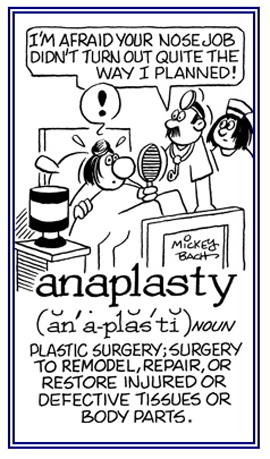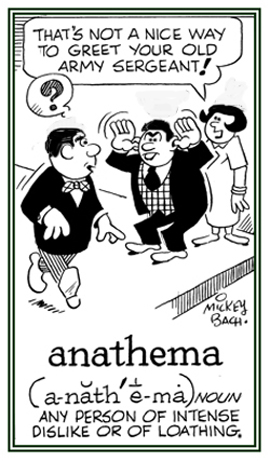ana-, an-, ano-, am-
(Greek: up, upward; back, backward, against; again, anew; used as a prefix)
2. A name that has the letters reversed; often done for anonymity, or to create a new name with some information encrypted in it; such as, with a parent who is naming a child.
2. A late stage of cell division during which chromosomes move to the poles of the spindle (a structure consisting of a network of microtubule fibers along which chromosomes are distributed and drawn apart during meiosis [process of cell division during which the nucleus divides into four nuclei] and mitosis [process by which a cell divides into two daughter cells, each of which has the same number of chromosomes as the original cell]).
2. The hypersensitive state which may develop after the introduction of a foreign protein or other antigen into the body tissues.
3. A severe, immediate, potentially fatal bodily reaction to contact with a substance (antigen) to which the individual has previously been exposed.
It is often triggered by antiserum, antibiotics, or insect stings.
2. The reconstruction or restoration; especially, by plastic surgery, of a lost or injured body part: The anaplasty was successful because the surgeon was able to reposition Victor’s forefinger so that it could serve as a thumb, replacing his severely damaged thumb.
3. The replacement or correction of damaged body parts, organs, etc. with surgery: The eye surgeon was able to perform an anaplasty on the patient, replacing her damaged cornea.

Go to this Word A Day Revisited Index
for a list of additional Mickey Bach illustrations.
2. The connection or communication between two tubular organs of normally separate parts or spaces so they intercommunicate.
3. The connection or place of connection of two or more parts of a natural branching system; for example, of blood vessels, leaf veins, stems of woody plants, or rivers.
4. The surgical union of two hollow organs: such as, blood vessels or parts of the intestine, to ensure continuity of the passageways.
An anastomosis may be naturally occurring or artificially constructed and be created during the process of embryonic development or by surgery, trauma, or pathological means.
For example, an anastomosis may connect two blood vessels (as in a naturally occurring arteriovenous anastomosis, a connection between an artery and a vein) or it may connect the healthy sections of the colon or rectum after a cancerous or otherwise diseased portion has been surgically removed.
A gastrojejunal anastomosis connects the stomach directly with the jejunum or part of the small intestine.
The term anastomosis comes from Greek. It originally referred to an opening or junction through a mouth as of one body of water with another.
Anastomosis has been in medical usage since the Greek physician Galen (129-200 A.D.) used it to describe the interconnections between blood vessels.
2. In rhetoric, the inversion of the natural or usual order of words; such as, "Homeward directly he went." "To market went she."
3. In computing, an operation by which each digit of a binary number is changed to the alternative digit, as 10110 to 01001.
2. A curse from a religious authority that condemns something or excommunicates someone: Patrick must have done something very sinful and horrible because his church decided that the only way to deal with him was the pronouncement of an anathema that would expel and remove him as a member of the congregation.
3. Etymology: from Latin anathema, "an excommunicated person, the curse of excommunication"; from Greek anathema, "a thing accursed"; originally, "a thing devoted". Literally, "a thing set up (to the gods)" from ana-, "up" + tithenai, "to place".

Go to this Word A Day Revisited Index
so you can see more of Mickey Bach's cartoons.
2. Rejection by means of an act of banishing or proscribing (excluding) someone.


